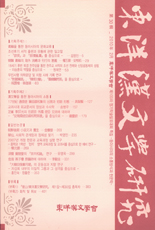학술논문
조선시대 여성글쓰기에 대한 사대부남성의 인식과 표기방식
이용수 668
- 영문명
- Gentry men's perception of women's writing in the Joseon Dynasty period and transcriptional method
- 발행기관
- 동양한문학회(구 부산한문학회)
- 저자명
- 권정원(Kwon, Jung Won)
- 간행물 정보
- 『동양한문학연구』東洋漢文學硏究 第41輯, 5~35쪽, 전체 31쪽
- 주제분류
- 어문학 > 한국어와문학
- 파일형태
- 발행일자
- 2015.06.30
6,520원
구매일시로부터 72시간 이내에 다운로드 가능합니다.
이 학술논문 정보는 (주)교보문고와 각 발행기관 사이에 저작물 이용 계약이 체결된 것으로, 교보문고를 통해 제공되고 있습니다.

국문 초록
조선시대 여성의 글쓰기[문학창작활동]에 대한 사대부남성들의 평가는 대체로 부정적이었다. 여성의 글쓰기, 즉 문자를 통한 욕망의 표출에 대한 부정이라면, 그것이 한문이든 언문이든 표기방식과 무관하게 평가되어야 한다. 하지만 실제의 경우는 다르다. 여성의 한문글쓰기가 ‘문학 활동 자체가 여성의 일이 아니라’는 이유로 강력하게 비난받은 것과는 달리, 여성의 언문글쓰기에 대한 제재는 거의 없었다. 이는 사대부 남성들의 한문과 언문이라는 표기방식에 대한 인식에 기인한 것이다. 한문은 중세보편문화의 상징이자, 상층 남성들의 전유물이었다. 사대부 남성들은 이를 통해 유교적 사상과 학문을 專有하였고, 이러한 문자사용 능력은 사회적 권위와 신분을 보장하는 상징이 되었다. 세종의 훈민정음 창제 이후 한문과 언문이라는 이중 문자를 사용해야 했지만, 사대부남성들의 세계를 유지시키는 문자는 한문이었다. 사대부남성에게 언문은 ‘여항의 비속한 말’, ‘야비하고 상스러운 무익한 글자’이며 ‘한낱 신기한 기예’에 불과했다. 사대부남성에게 한문은 상층의 문화를 대변하는 우월한 것이었고, 언문은 하층의 문화를 드러내는 열등한 것이었다. 이러한 표기방식에 대한 인식은 성리학적 이데올로기와 맞물려 ‘남성:여성=상:하=한문:언문=우월:열등’이라는 인식을 가져왔다. 따라서 여성이 언문을 사용하여 문학 활동을 하는 것에는 거부감이 없었지만, 여성이 상층 남성의 전유물인 한문을 공유한다는 사실에 대한 불편함이 여성의 한문글쓰기에 대한 부정적 시각으로 나타난 것이다. 이러한 여성의 한문글쓰기에 대한 부정적 시각은 여성의 글쓰기 활동 자체를 제지하는 요인으로 작용하였다. 여성들은 한문을 안다는 사실을 드러내길 꺼렸고, 시문 창작을 하거나 문집을 발간하더라도 죽기 전에 스스로 불태우는 행위를 서슴지 않았다. 결국 사대부 남성의 여성 한문글쓰기에 대한 경계와 비판은 여성 스스로가 언문이라는 표기방식을 채택하도록 하는한 요인으로 작용했던 것이다.
영문 초록
Gentry men's evaluation of women's writing in the Joseon Dynasty period was negative in general. If the negative evaluation is the negation of women's writing, that is, the expression of desires through letters, women's writing should have been evaluated regardless of transcriptional methods, that is, Chinese classics or Hangul. However, it was not the case in the reality. Unlike women's Chinese classics writing that was severly
criticized for the reason that ‘Literature activities per se are none of women's business’, women's Hangul writing was hardly restrained. This is due to gentry men's perception of the transcriptional methods; Chinese
classics and Hangul. Chinese classics was the symbol of medieval universal culture and an exclusive property of upper class men. Gentry men exclusively owned Confucian ideas and learning through Chinese classics and the ability to use these characters became a symbol that guaranteed social authority and status. Although they had to use two characters; Chinese classics and Hangul after the creation of the Hangul by king Sejong, the characters that maintained gentry men's world were Chinese classics. To gentry men, the Hangul was just ‘an abusive language in the country’, ‘indecent words of middle class communities’ and ‘a novel art.’ To gentry
men, Chinese classics was a superior thing that represented upper class' culture and Hangul was an inferior thing that revealed lower class' culture. This perception of transcriptional methods interlocked with neo-Confucian ideology to bring about the perception that men:women=top:bottom=Chinese classics:Hangul=superior:inferior. Therefore, although there was no repulsion against women's literature activities using Hangul, gentry men's inconvenience about the fact that women shared Chinese classics that was an exclusive property of upper class men appeared as negative views of women's writing in Chinese classics. These negative views of women's writing in Chinese classics acted as a factor that restrained women's writing activities perse. Women were unwilling to reveal the fact that they knew Chinese classics and even if they created poetry and prose or published a collection of works, they were unserved in burning it before they died. Eventually, gentry men's vigilance and criticism against women's writing in Chinese classics acted as a factor that made women adopt the transcriptional method termed Hangul by themselves.
목차
Ⅰ.머리말
Ⅱ.여성글쓰기에 대한 사대부남성의 평가
Ⅲ.한문․언문의 표기방식에 대한 사대부남성의 인식
Ⅳ.여성글쓰기에 대한 억압과 승인, 그리고 여성의 자기검열
Ⅴ.맺음말
키워드
해당간행물 수록 논문
참고문헌
관련논문
어문학 > 한국어와문학분야 BEST
- 국어의 줄임말 현상에 따른 언어변이 양상과 문제점
- ‘밈(meme)’을 활용한 고전문학과 문화콘텐츠의 상호 협력과 융복합교육
- 연구 동향 분석을 통해 본 학문 목적 한국어교육 연구의 실태와 제언
최근 이용한 논문
교보eBook 첫 방문을 환영 합니다!

신규가입 혜택 지급이 완료 되었습니다.
바로 사용 가능한 교보e캐시 1,000원 (유효기간 7일)
지금 바로 교보eBook의 다양한 콘텐츠를 이용해 보세요!





